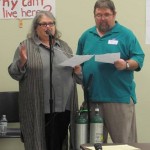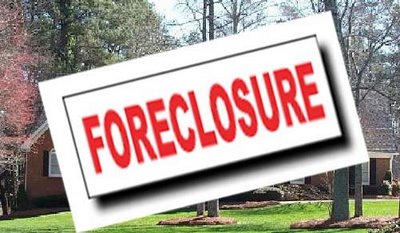Debra and Jimi Miller are tenant leaders with MTO. The Millers have been active at MTO over the past year and got involved when they received a housing choice voucher. Prior to receiving the voucher, the Millers had been homeless. Both were able to obtain shelter in transitional programs; however they were staying across the City from one another. Chicago boasts many shelters and transitional programs; but the majority of these programs serve either men or women – not families and not couples. The Miller’s struggled to be together during this period. Due to Debra’s health problems, the responsibility fell to Jimi to commute north everyday for visits. And in the evening, they would watch television programs together over the phone. Needless to say, the arrival of housing choice voucher was celebrated as the first step toward living together again.
That excitement was quickly diminished when the couple realized that their long fight to be reunited had just begun. Despite the fact that it is against the law in Chicago for landlords to refuse to rent to someone based upon their source of income, this practice still takes place. Jimi and Debra had three months to find a place to live before they lost their voucher. Two months into their search, they finally found a place. The discrimination and desperation of their search left them with a desire to work for change.
Debra had been an activist protesting the U.S. involvement in Vietnam. According to Jimi, a veteran, “She’s the resident militant.” When Debra found that she and Jimi were facing homelessness, she was again thrust into activism through 100K. The 100K program was an effort undertaken in cities across the country to get an accurate count of homeless families and individuals living on the streets. Here she met Leah Levinger and got involved with the Chicago Housing Initiative. When she and Jimi received their voucher and were no longer facing homelessness, she began looking for a new social justice focus to lend her support. Levinger pointed her toward the Source of Income Campaign at MTO. MTO was part of a coalition working to get the same type of protections for renters in suburban Cook County which exists in the City of Chicago for voucher holders. Having experienced some of this discrimination first hand, the Millers were eager to get on board. When asked about their motivation to become involved in the Source of Income Campaign, Debra states, “We had to be a part of it!” At the same time Jimi says, “We had to do it.” “It was still personal to us,” explained Debra. They hit the ground running by participating in a rally and demonstration in Oak Park targeting a landlord who advertised “No 8s,” meaning he would not rent to any Section 8 voucher holders.
MTO intentionally incorporates tenant leaders in planning and strategizing campaigns. The Millers enjoyed the experience of being at the table and helping to make decisions around how the work would move forward. After the successful passage of the Source of Income Ordinance in suburban Cook County, they continue to participate with MTO as active tenant leaders. Currently they serve on MTO’s Tenant Congress HUD Subcommittee. The Miller’s reside in Rogers Park and are happy to finally be able to come home… together.
View the original post by Chicago Equal Voice here: http://on.fb.me/Ih4I83


 In January of 2011, tenants from a senior building at 353 E. 53rd Street called MTO complaining of repair problems in their building. The hotline counselor suggested
In January of 2011, tenants from a senior building at 353 E. 53rd Street called MTO complaining of repair problems in their building. The hotline counselor suggested  In August of 2008 tenants from a building in Englewood called MTO’s Tenants Rights Hotline complaining about egregious conditions including broken security locks, pest infestations, and lack of essential services, like heat. MTO immediately sent organizers out to assess the situation. The Ada-Throop buildings are subsidized by the US Department of Housing and Urban Development (HUD). In addition to confirming the deplorable conditions tenants reported, MTO organizers learned that the building was in foreclosure and that the building’s subsidy was at risk.
In August of 2008 tenants from a building in Englewood called MTO’s Tenants Rights Hotline complaining about egregious conditions including broken security locks, pest infestations, and lack of essential services, like heat. MTO immediately sent organizers out to assess the situation. The Ada-Throop buildings are subsidized by the US Department of Housing and Urban Development (HUD). In addition to confirming the deplorable conditions tenants reported, MTO organizers learned that the building was in foreclosure and that the building’s subsidy was at risk.